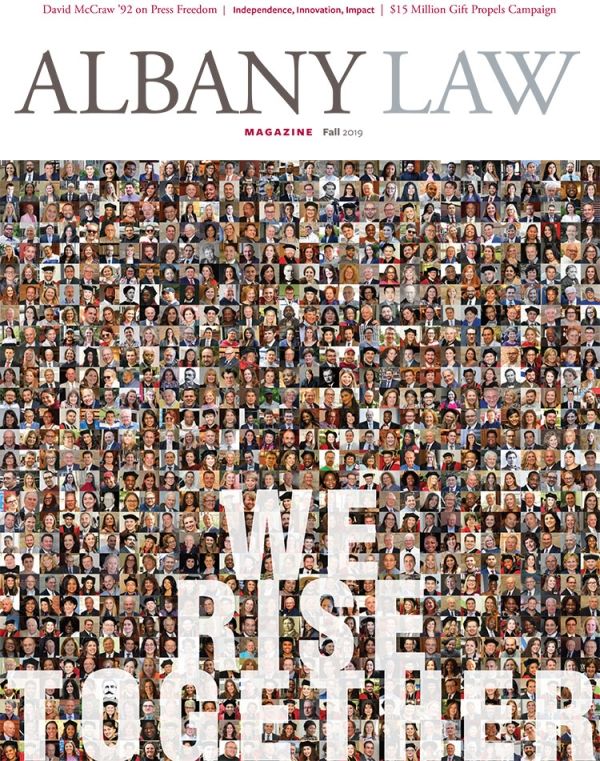Hats Off to an Albany Legal Legend
WHEN A MAN HAS WORN AS MANY HATS and held as many prestigious positions as Leonard A. Weiss ’48, exactly how do you address him? Judge Weiss? Justice Weiss? Presiding Justice Weiss? Commissioner Weiss? Chair Weiss? How about Elec-tor Weiss? He makes it easy: “Call me Len.”
Weiss is a true legend in the Albany legal community: Albany City Court judge; Supreme Court justice; Appellate Division, Third Department justice and presiding justice; president of the Association of Justices of the Supreme Court; chair of the Albany County Democratic Committee; commissioner of the New York State Public Service Commission; member of the Electoral College. Yet his core humanity and humility shine through in his indifference to the formalities of title. “Call me Len” is the title of a short video Weiss’ daughter put together as a tribute to her father some years ago. It depicts a humble, grateful man, the child of Hungarian immigrants who grew up in poverty and seems genuinely astonished that he reached such heights as an attorney and judge, met Pope John Paul II, and cast a ballot as a member of the Electoral College in 1996. “Who in the world would ever believe that a Jewish kid who grew up in poverty in Buffalo, New York, was going to end up on the Electoral College?” Weiss asked incredulously.
Albany Law School changed his life in more ways than one. On his first day of law school—new to Albany, living in a $5-a-week room on Morton Avenue and knowing no one—Weiss introduced himself to a classmate, Arnold Rosenstein ’48, whose family happened to own the most renowned restaurant in town, Jack’s. Rosenstein offered to introduce Weiss to his cousin, Sandee Sanders. Weiss went out with Sandee that very evening. “I was smitten,” he recalled. Apparently—he asked her to marry him.
Destiny brought Weiss to Albany in the first place. As a soldier in World War II, Weiss was honorably discharged after suffering an injury that ended his military days, but the Veterans Administration offered to send him to graduate school. Weiss indicated he would like to study law, and the V.A. got him into Albany Law School. “Albany Law School was probably the most significant thing in my life,” Weiss said. “It gave me an ability, and it gave me an opportunity I don’t think I would have otherwise had. It stressed legal and moral values—treating people with kindness, dignity, and fairness. And when I graduated, I was prepared both to pass the bar exam and practice law.”
This spring, the current presiding justice, the Honorable Elizabeth A. Garry ’90, interviewed Weiss for a documentary that was unveiled in September. What emerged from that interview was a man decades ahead of his time in advocating for women and people of color in the profession. “When I was a student at Albany Law School, there were several hundred students [and] one woman. All the rest were men,” recalled Weiss, who is now special counsel at McNamee Lochner in Albany, concentrating on alternative dispute resolution. “When I got admitted to the bar in the County of Albany in 1948, there were two women among all the lawyers practicing. I knew that wasn’t right.”
Presiding Justice Garry said that even though Weiss retired from the Appellate Division in 1994, his legacy continues. “Judge Weiss has had a tremendous impact and a highly positive influence on so very many of us; he is a model of fairness, treats others with a remarkable empathy, and embodies the quality of dignity,” she said. “He consistently promotes virtues in a notably progressive and inclusive manner. I am honored to know him as a colleague —and to call him a friend.”
One of those on whom he made an impact was Associate Justice Michael Lynch ’79, who clerked for Weiss from 1981 to 1989 and fondly refers to his former boss as “the dean of the Albany County bar.” “He has always been a great role model and mentor to so many attorneys,” Justice Lynch said. “Judge Weiss has a true passion for the law and a work ethic second to none. His career stands testament to the integrity of our justice system.”
PRINT ISSUE
Click for downloadable PDF

